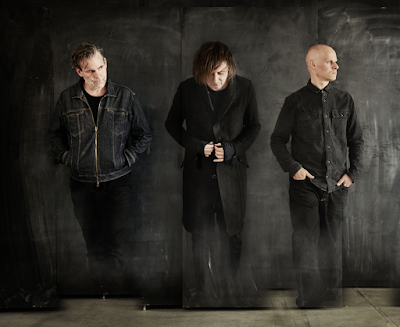 |
| Eubanks Evans Experiment: Imani Records |
Guitar wizard Kevin Eubanks is a member of a jazz family that includes his two brothers, younger Duane a trumpeter, and elder brother Robin an established trombonist. Eubanks attended Berklee and has worked with drummer Art Blakey, saxophonist Sam Rivers, and bassist Dave Holland. The guitarist made his presence known more widely to the public when he became the musical director of the band of the Tonight Late Show and the subsequent Jay Leno Show from 1995-2010.
Orrin Evans attended Rutgers, worked with drummer Ralph Peterson, saxophonist Bobby Watson, soprano saxophonist Sam Newsome, and studied with master pianist Kenny Barron. He has made his mark with his work with the quartet TarBaby, his Grammy-nominated Captain Black Big Band, and increasing his exposure to a wider audience by replacing leaving pianist Ethan Iverson for a time with The Bad Plus.
These two created a dynamic duo for this album and titled it the Eubanks Evans Experience. The synergy here becomes apparent from the opening cut “Novice Bounce,” a Eubanks composition from his debut album Guitarist from 1983. This groove starts with some delicate guitar work and some precisely accompanied piano work that demonstrates just how in-tune these two can be. Like two joyously dancing fairies in an enchanted forest, there is a magical air to this one. The group morphs it into a more soulful endeavor with Evans' syncopated piano. Eubanks guitar increases the funk quotient without ever losing the sensitivity. His slithery guitar work shows a commanding articulation and an inherent flare that are impressive.
One of the most beautiful interpretations from the duo takes a soul/funk, some may say smooth jazz, hit from trumpeter Tom Browne from 1980 titled “Dreams of Loving You.” Eubanks and Evans reimagine this as a dreamy haunting ballad. Evans introduces this with a sensitive statement of the catchy and moving melody. Eubanks is the star here with his deft modulating guitar sound that emerges from Evans’ entry with an almost eerie Theremin-like sounding line that eeks with longing and pathos. This one is just beautiful.
The two break it up with a blues/funk-drenched collaboration “I Don’t Know” that raises the temperature of the proceedings up a couple of notches. Eubanks guitar is slippery and gut-busting and Evans’ piano takes on the feel of a barrel-house honk-tonk. The two get into it and play off each other’s ideas telepathically in a way that flows spontaneously.
“As They Ran Out of Biscuits” is a free-style collaboration that seems to be built by establishing a groove and then taking the improvisations to where they may go. This is probably the least structured and most adventurous of the set. This will not be everyone’s cup of tea but there is a real joy to absorb the active fluid collaboration going on here.
Orrin Evans composed the next ballad “Dawn Marie” for his wife. Eubanks opens the song with his own creative lead before the two enter this fetching melody. Evans plays beautifully here. There is obviously a deep connection with the loving sentiment that Evans intends to convey with this composition, and his touch and feel speak volumes. Eubanks is a master of using his electronics on his guitar to enhance his instrument’s effect. Here, his control is spookily modulated, perfectly aligning his sound to the mood intended.
The last two cuts of this album “Variations on the Battle” and Variations on Adoration” were both apparently recorded live at Chris’s Jazz Café in their hometown of Philadelphia. The two use two songs Evans’ “Half the Bottle” from his album #knowishalfthebattle of 2016 and Eubanks's “Adoration” from his album Zen Food from 2010 as the armatures upon which to improvise and expand. In the longer “Variations on the Battle” Eubanks exhibits a fusionist approach. His lines bloom in front of you as he gestates his ideas in an organic process that compliments over Evans' fertile backdrop. These two are brain-linked when playing so there is no hesitation, no awkward transitions they simply follow each other intuitively.
The shorter “Variations on Adoration” has a more melodic identity and Eubanks gently finger picks the entry as Evans creates lush pianistic lines. There is an exploratory feel to this composition as the two find a pulsating path to follow here, one that has a heartbeat of its own.
Eubanks Evans Experience is just that an experience; one that requires attention, one that requires awareness of nuance, and the ability to appreciate the true creative excellence of these two marvelous musicians. I will be looking forward to more from these two.

